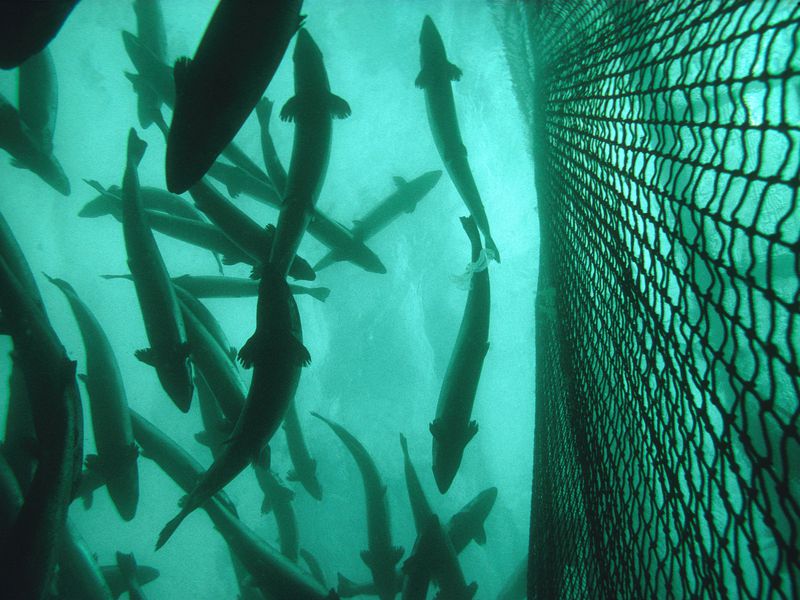Thousands of Atlantic salmon escaped from a fish farm pen off the coast of Washington late last week, threatening native Pacific salmon and causing officials to enlist the help of citizen fishers in an effort to catch them.
Like most salmon farms, Cooke Aquaculture Inc. raises its stock in large netted pens positioned in ocean waters. Last Saturday, one of its nets holding more than 300,000 Atlantic salmon in the waters off Washington's Cypress Island was damaged. It collapsed Sunday, reports Lisa Johnson of CBC News, releasing thousands of salmon into the Salish Sea between Washington and Canada's Vancouver Island. Initial estimates suggest 4,000 to 5,000 creatures escaped, but officials say the true number could be "much higher,"Johnson reports.
In a statement, Cooke Aquaculture blamed "exceptionally high tides and currents coinciding with this week’s solar eclipse" for its net collapsing, but experts are skeptical of this explanation, reports Monica Hunter-Hart for Inverse.
Tide levels near Cypress Island reached 11.7 feet at the height of Monday's eclipse, when the tidal forces from the new moon would be strongest, tidal expert Jonathan White tells Hunter-Hart, a height fairly close to the median level for tides in the area for 2017. Environmentalist Chris Wilke tells Mapes and Bernton that Cooke Aquaculture's explanation is "B.S."
The net that collapsed had, in fact, needed emergency repairs last month after crews saw it swaying in currents, Johnson reports.
Atlantic salmon are considered an invasive species by Washington state, and fishermen in the region are now concerned about the impact these fish could have on native Pacific salmon, whether by competing for food, crossbreeding or even eating juveniles, reports Ashifa Kassam for the Guardian.
Cooke Aquaculture and some experts downplayed these concerns this week, noting that previously released Atlantic salmon in the region have never successfully survived or interbred with native fish, reports Lynda Mapes and Hal Bernton for the Seattle Times.
Nevertheless, the Washington Department of Fish and Wildlife is viewing the threat very seriously, asking all licensed fishers to help catch the escaped fish, reports Scott Neuman of NPR, relaxing rules on size and numbers for the species.
"Our first concern, of course, is to protect native fish species," Ron Warren, head of WDFW's Fish Program, says in a statement. "So we'd like to see as many of these escaped fish caught as possible."
Canadian authorities have also asked fishers to keep an eye out for the foreign salmon, but to simply report any sightings instead of trying to catch them, writes Sarah Petrescu for the Victoria Times Colonist.
Wilke's organization, Puget Soundkeeper, is one of a number of environmental groups in the Pacific Northwest calling for an end to Atlantic salmon aquaculture in Washington state. The Wild Fish Conservancy Northwest has been campaigning this year to block an expansion of salmon farming in the Salish Sea by Cooke Aquaculture.
"We urge you to continue your work protecting Puget Sound and its salmon by stopping the expansion of Atlantic salmon net pens," the organization said in a petition to Washington Governor Jay Inslee.
